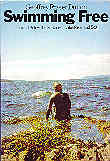Snorkeling = surface floating/dog paddling/swimming with a mask and snorkel often with buoyancy assist devices for non swimmers like arm floaties and cute little seahorse tubes with seavue windows.
Skindiving = the art and sport and science of diving without SCUBA now often refereed to as freediving or breath hold diving.
______________________________________________________________________________
Skindiving may refer to:
* Freediving, or breath-hold underwater diving
_____________________________________________________________________________
Freedivers/skindivers/breath hold divers may or may not use a snorkel. When I was into the sport I did not use a snorkel. N
I'd agree more or less with Nemrod's definition of skindiving, and freediving, if we are sticking to the modern usage of both terms. The problem is historical usage. Like "freediving", the term "skindiving" was originally coined to distinguish it from hardhat diving in bulky canvas suits and lead-soled boots. When the term "SCUBA" was coined, some people started to use the term "skindiving" to denote breathhold diving only, while others (including "The Skin Diver" magazine itself, persisted in using the term for all underwater swimming, whether breathing apparatus supported or not.
Nemrod's tongue-in-cheek definition of snorkelling may also be largely accurate, but it also gets to the heart of this thread in flagging up some divers' perceptions of snorkelling as a wimpish pursuit for beginners. This attitude was much less widespread in earlier decades when the ability to snorkel was considered to be an indispensable foundation for scuba diving. When I joined my British university sub-aqua club back in the mid-1960s, nobody was permitted anywhere near SCUBA gear before they were able to retrieve, and don, their basic equipment from the bottom of a swimming pool, and to clear a waterlogged mask, all without the assistance of breathing apparatus. Messages on Scubaboard forums suggest that this rule is no longer applied.
If we are looking for an alternative to the word "snorkelling", I would suggest abandoning any diving reference and using a term such as "freeswimming" instead to describe what serious snorkellers do. It's in the title of a seminal British book from 1972, "Swimming Free: On and Below the Surface of Lake, River and Sea" by Geoffrey Fraser Dutton (London:Heinemann):
The blurb reads:
"What can we do with ourselves," asks the author, "what
is there to do, once we have gone to the bother of learning to swim?" In this book he tells us. It was a question that needed answering; for of all the tens of thousands who each year become competent swimmers, only very few ever venture beyond littered holiday beaches or the chlorinated rectangles of public baths. It is as if on land we felt ourselves bound to stay in crowded parks or gymnasia, and ignored our freedom to ramble or laze among hills and open country. Here under our noses - not in the distant tropics, but in our own rivers, lakes and the sea, even in pond and ditch and flooded meadow - is hidden a new and unsuspected world, now accessible for the first time to the ordinary careful swimmer: and he needs no more than flippers, face mask and snorkel and - in winter for those who hate cold water - an inexpensive rubber suit for warmth. With such simple aids, man becomes a water animal again, free to rediscover his ancestral home; released from the tyranny of gravity, as he moves and floats on or below the surface he feels disembodied and exalted, his senses mysteriously quickened. The world is born afresh in wonderful shapes and colours.
Dutton's robust concept of snorkelling as an element of what we now know as "swimhiking", combining cross-country walking with open-water swims, is the exact opposite of some people's perception of the activity as something only done in warm waters in far-away places by the very young or the very timid. Dutton's kind of snorkelling is also mine. Here in the UK, there is a growing number of stalwarts who style themselves "wildswimmers" and regularly swim in rivers, lakes and the sea itself, often in the depths of winter and without fins, mask, snorkel or even a full wetsuit. There can be just as much fun, camaraderie and exercise on as well as below the water surface.





